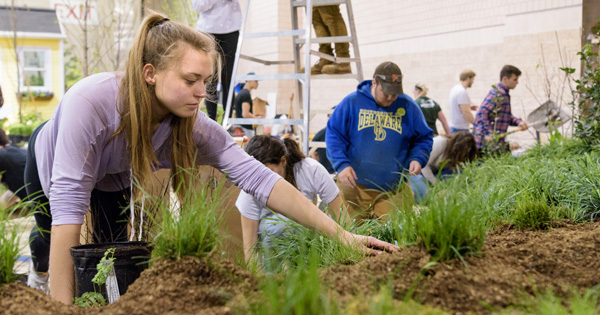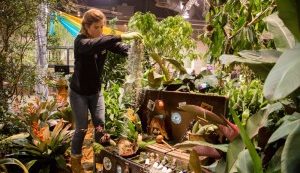
Plant Science major
Major in plant science at the University of Delaware: youtube.com/watch?v=ol2SJ6th4Ts
The plant science major applies the principles of biology, chemistry, and agriculture to plant life. The curriculum is flexible enough to let students create an academic program with their advisor that suits each individual's career goals. Our faculty-guided concentrations include agronomy, plant pathology, plant biology and genetics, sustainable landscapes, production horticulture, and soils and environmental quality.
Outcomes
Plant scientists make their careers in a wide array of disciplines. Our graduates work as landscape professionals, plant pathologists, plant biologists, agronomists, garden center professionals, golf course superintendents, geneticists, plant breeders, crop consultants, and environmental quality scientists. Many Blue Hens go onto graduate degrees on programs focused on plant pathology, biology, genetics, physiology, and molecular biology. And there are a multitude of jobs for plant science majors! According to Seed Your Future, 39 percent of all horticulture jobs go unfilled each year due to insufficient graduates.
Structure
Students receive a solid foundation of coursework in botany, soil science, plant physiology, genetics, plant identification, plant pathology and chemistry. Students also interact with faculty both in and out of the classroom, working with faculty on research projects, independent studies, and study abroad programs.
Uniqueness
From gene sequencing to public horticulture, our program is broad, allowing students to explore across the aforementioned disciplines and then choose an area of concentration. In UD’s plant science major, our class sizes are small and individual interactions with professors are the norm. Students are drawn to the outstanding facilities that are on UD’s main campus. Our college boasts a 350-acre farm, a state-of-the-art greenhouse complex, an extensive botanic garden, modern computing facilities, wetlands, ecology woods, agronomic field plots, a recently renovated laboratory facility, and the nearby Delaware Biotechnology Institute.
This sample shows just one possible pathway to earning a bachelor of science degree in Plant Science in four years. This plan does not replace the advice of your advisor.
Course highlights
Students develop a concept of soil and its importance to the welfare of society, learning how soils form and interpretation of basic soil properties. Instructors share knowledge about the fundamental physical, chemical, and biological properties of soils, their relationships to one another and their effect on plant growth, environmental quality, and land use. The course develops students’ abilities to make management decisions for both agricultural and nonagricultural uses.
A basic, survey overview of fermented products. It covers a range of topics, including fermentation history, biochemistry behind fermentation, different fermentative organisms, and production of many popular items such as cheese, bread, beer and vegetables, among other items.
Instructors share an introduction to nature, causes, development, effects and control of plant disease. Laboratory work involves microscope use for examining plant disease specimens and fungal structures, and experience in isolation and culture of pathogenic fungi. Objectives include making students aware of the economic importance and historical significance of plant diseases and introducing the concept that abiotic (environmental) factors and micro-organisms (like bacteria and viruses) cause plant diseases.
Trees are one of the most important features in cities and towns across the world, and especially in our region. This introductory course on urban forestry covers how trees affect urban climate, air pollution, water and, in-turn, how the urban environment affects tree growth and health. Students examine urban forest planning and management, and methods for appraisal and value of urban forests. This course culminates in class projects that combine our understanding of urban environmental conditions and tree species’ functional traits to make recommendations for “the right tree in the right place.”
This course will introduce students the principles and applications of environmental forensic sciences. Students apply chemical, stable and radioisotopes as tools to trace as well as address a variety of contemporary forensic problems, including environmental contamination of drugs and chemicals, climate change and wildlife forensics, archaeological forensics and human migration, authenticity of food and luxury products, criminal investigations including drug use and trafficking, weapons tracing, and counterfeit detection. Analytical methods including data collection, field/site mapping, chemical-biological and isotope pattern of recognition, and forensic report preparation consistent with environmental regulations will be discussed as the basis for quantitative and qualitative forensic diagnostics.
Instructors share a practical application of the basic principles of soil chemistry, physics and microbiology to modern land use programs. The course covers basic principles of nutrient management (availability and cycling in soils, roles in plant nutrition), soil acidity and liming, soil testing, environmental fate of non-essential elements and organic chemicals, and role of risk assessment in soil management.
Instructors cover the basic structures and functions of plants. Students learn about plant cells, tissues, organs and the physiological functions that occur to sustain life. Instructors also focus on how plants grow and reproduce, how they obtain the essential materials for growth, and how plants interact with each other. These topics become a foundation in studying about how plants interact with their environment.
Students focus on Eastern native United States and broad-leaf and coniferous plants used in the landscape. Faculty instructors focus on include native habitat, ornamental features, potential pest problems and taxonomy using cut samples as well as landscape specimens.
Related student organizations

APPLY NOW
Associate Director, CANR Undergraduate Recruitment


